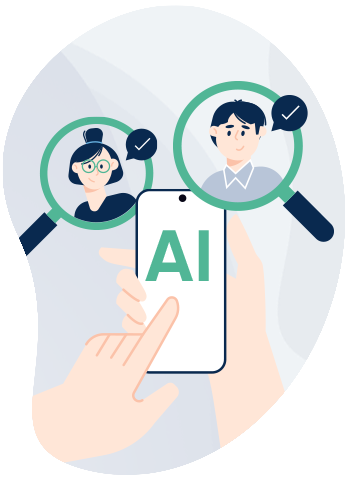Artificial Intelligence has stepped into our lives like a storm. We rely on ChatGPT to write emails, let AI recommend what to watch next, and even ask it questions we once typed into Google. From how we shop to how we work, AI has inserted itself into almost everything we do.
One question keeps popping up in boardrooms, offices, and coffee chats: “Will my job be replaced by AI?”
For people in Human Resources, the question hits close to home. Some HR tasks are already being automated, making jobs faster and easier. But others may not survive at all.
In this article, we’ll look at which HR roles AI is changing, which ones might disappear, and how HR pros can stay valuable in an AI-powered future.
Understanding the Use of AI in Human Resources
You might not even notice it, but AI is already in HR systems all around you. Some examples:
- LLMs for communication: HR teams draft job descriptions, internal updates, or policy guides with AI’s help.
- Smart scheduling tools: Instead of endless email ping-pong, AI calendars line up interviews in seconds.
- AI-powered sourcing: Tools scan millions of profiles to find candidates who fit specific skills.
- Chatbots for HR help: Employees ask about leave policies, benefits, or pay slips and get instant answers.
- Predictive analytics: AI crunches data to forecast turnover, engagement levels, or future hiring needs.
In other words, AI in HR is already making life easier by cutting down on admin work. But it’s also raising the big question: if AI can do this much now, what’s next?
Understanding AI in HR: From Automation to Augmentation
To get a better sense of what’s going on, let’s break it down.
Automation means AI handles repetitive tasks like checking resumes or sending reminders.
Augmentation is when AI doesn’t exactly replace you but helps you do more (like suggesting interview questions based on a job description).
Prediction happens when AI can forecast data such as who might leave the company, helping HR step in earlier.
That last part is especially powerful. Predictive AI has shown it can anticipate employee turnover with up to 87% accuracy in some studies (Source). This gives HR teams the chance to plan ahead and avoid costly surprises.
Other research shows that AI reduces time-to-hire by an average of 50%, and 75% of recruiters say AI tools help them speed up the hiring process (Source).
Learn more about how AI can help recruiters and HR staff in our article: AI for recruiting – How artificial intelligence can help recruiters?
Snapshot 2025: Where Adoption Stands Today
Let’s look at where things stand right now.
Key stats from recent studies:
- 45% of organizations report using AI tools in HR functions (Source)
- Another 38% plan to adopt it in the near future (Source)
- But HR is behind: only ~9% of HR teams use AI, compared with 25–26% of other departments like sales or finance (Source)
- 75% of recruiters say AI helps speed up their work (Source)
So, the adoption is uneven, but the impact is already big.
Here’s the twist: there’s also a gap between what leaders think is happening and what employees are actually doing.
According to McKinsey, nearly everyone—94% of employees and 99% of leaders—knows about generative AI tools. But leaders often underestimate usage. They guess that only about 4% of employees use AI for 30% of their daily work. In reality, it’s three times higher (Source).
This shows AI is spreading faster than most leaders realize, and HR has to bridge that gap by guiding adoption.
Which HR Roles Will Be Replaced by AI? (and Which Won’t)
AI won’t replace all HR roles, but it will hit some harder than others. Here’s how to tell the difference:
| High chance of automation | Low chance of automation |
| RepetitiveRule-basedData-heavyDoesn’t require empathy | Relies on emotions, context, or judgmentInvolves complex negotiationsShapes company culture |
Using that lens, let’s look at the HR roles most likely to change (or disappear) in the AI era.
HR Roles Likely to Shrink (Automation-Heavy Roles)
- Recruiting coordinators: Resume screening and scheduling are almost fully automatable.
- Sourcing specialists: AI can scan profiles faster and more accurately than humans.
- HR operations admins: Document processing, ticket answering, and payroll checks are easy AI wins.
- Benefits administrators: AI tools already manage claims, FAQs, and enrollment.
Evolving HR Positions (AI-Enhanced Roles)
- Talent acquisition partners: Instead of sourcing, they’ll focus on candidate experience and strategy.
- HR business partners: With AI analytics in hand, they can shift to advising leaders.
- L&D designers: AI suggests training paths, but humans ensure they match company culture.
- Compensation analysts: AI can crunch numbers, but humans set policy and fairness.
Durable HR Positions (Human-Centric Roles)
- Employee relations specialists: Conflict resolution needs empathy.
- Culture and DEI leaders: AI can track metrics, but humans inspire inclusion.
- Strategic HR leadership: Setting direction requires vision, not algorithms.
- Change management pros: Only people can guide people through transitions.
Notice the pattern? AI clears away busywork, freeing HR professionals to focus on people work.
Building an AI-Ready HR Departments
AI is powerful, but it’s not perfect. Without oversight, it can cause big problems. Here’s where law meets technology. The EU AI Act is the world’s first big legal framework for AI, and it directly impacts human resources.
For HR departments, that means AI tools can help, but HR professionals must stay in the driver’s seat. You can’t let a machine decide who gets hired or promoted without human review.
So, how should HR teams prepare? Here’s a roadmap:
- Audit roles
Figure out which tasks AI can take on, and which require humans.
- Upskill teams
Offer AI literacy training, just like digital literacy years ago.
- Appoint AI champions
Assign team members to monitor new tools and best practices.
- Partner with IT & Legal
Work closely to ensure compliance and safe data use.
- Test in small pilots
Try AI in one process (like interview scheduling) before scaling up.
Conclusion: Which HR Roles Will Be Replaced by AI?
AI doesn’t really replace jobs. Instead, what it replaces are tasks. And that’s a huge difference.
41% of the workforce fears losing their jobs to AI (Source). But here’s the reality: an HR recruiter doesn’t only screen resumes. They also talk to candidates, work with hiring managers, negotiate offers, and build relationships. AI may take over resume screening, but the relationship-building part still belongs to humans.
Instead of entire HR roles disappearing, what we’re really seeing is this: AI is breaking jobs into pieces, automating repetitive tasks, and freeing HR professionals to focus on higher-value work.
The real challenge is adaptation. With the right training and leadership, employees save over an hour a day using AI. But without HR driving AI literacy, organizations risk falling behind.
That means your job isn’t as threatened as you might think. It’s just going to look a little different than it used to.
FAQ
- Will AI completely replace HR professionals?
No. AI takes over repetitive tasks like screening resumes or scheduling interviews, but HR professionals are still needed for strategy, people management, and culture building. - Which HR role is most at risk of automation?
Recruiting coordinators and HR operations roles are most at risk since their work is repetitive and rule-based. - Can AI make hiring less biased?
Yes, but only if the data it learns from is fair. If the data is biased, AI can repeat those same biases. That’s why human oversight is essential. - How does AI actually help recruiters?
AI speeds up resume screening, schedules interviews automatically, and even predicts which candidates are more likely to succeed. This lets recruiters spend more time connecting with people. - Will managers also be replaced by AI?
Not fully. AI can help managers with reporting or scheduling, but leadership, decision-making, and motivating teams still require humans. - How can HR professionals prepare for AI?
By learning new skills (like HR analytics, AI literacy, and emotional intelligence) and by guiding their companies through AI adoption. - Is AI in HR safe to use?
Yes, if used responsibly. Laws like the EU AI Act require human oversight to make sure AI doesn’t make unfair or harmful decisions. - Does AI save HR teams time?
Definitely. Studies show that with proper training, almost half of employees say AI saves them more than an hour every day.

